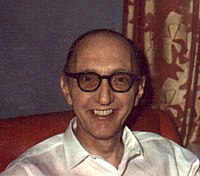Paul Linebarger
| Cordwainer Smith | |
|---|---|

Smith, c. early 1960s
|
|
| Born | Paul Myron Anthony Linebarger July 11, 1913 Milwaukee, Wisconsin, US |
| Died | August 6, 1966 (aged 53) Baltimore, Maryland |
| Occupation | Writer, professor, military officer |
| Nationality | American |
| Education | PhD in political science |
| Alma mater | Johns Hopkins University |
| Period | 1937–1965 |
| Genre | Science fiction |
| Subject | East Asia political science, psychological warfare |
| Notable works | "Scanners Live in Vain" Psychological Warfare |
| Spouse | Margaret Snow Genevieve Collins |
| Children | Several |
| Relatives | Sun Yat-sen (godfather) |
Cordwainer Smith (/ˈkɔːrdweɪnər/ KORD-way-nər) was the pen-name used by American author Paul Myron Anthony Linebarger (July 11, 1913 – August 6, 1966) for his science fiction works. Linebarger was a noted East Asia scholar and expert in psychological warfare. ("Cordwainer" is an archaic word for "a worker in cordwain or cordovan leather; a shoemaker", and a "smith" is "one who works in iron or other metals; esp. a blacksmith or farrier": two kinds of skilled workers with traditional materials.) Linebarger also employed the literary pseudonyms "Carmichael Smith" (for his political thriller Atomsk), "Anthony Bearden" (for his poetry) and "Felix C. Forrest" (for the novels Ria and Carola). He died of a heart attack in 1966 at Johns Hopkins University Medical Center in Baltimore, Maryland, at age 53.
Linebarger was born in Milwaukee, Wisconsin. His father was Paul M. W. Linebarger, a lawyer and political activist with close ties to the leaders of the Chinese revolution of 1911. As a result of those connections, Linebarger's godfather was Sun Yat-sen, considered the father of Chinese nationalism.
...
Wikipedia
